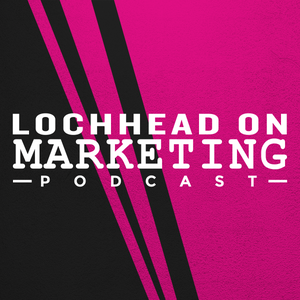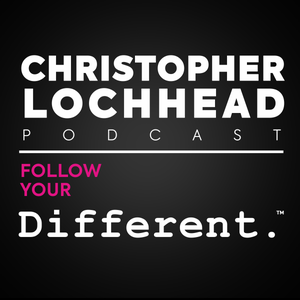
Lochhead on Marketing
Christopher Lochhead
with Christopher Lochhead
- 17 minutes 26 seconds200 Thinking About Thinking Is The Most Important Kind Of Thinking
On this episode of Lochhead on Marketing, let’s talk about why thinking about thinking is the most important kind of thinking.
This isn’t just another buzz phrase; it’s a fundamental practice that can revolutionize the way we approach entrepreneurship, marketing, and business strategy. So we thought that it would be a good idea to refresh new listeners minds and remind the old heads why Context is always King.
Welcome to Lochhead on Marketing. The number one charting marketing podcast for marketers, category designers, and entrepreneurs with a different mind.
The Power of Context in Decision-Making
In the realm of business, context is everything. It shapes our discussions, influences our decisions, and ultimately determines the trajectory of our companies. It’s not just about the data or the trends; it’s about grasping the bigger picture and recognizing the underlying currents that drive market dynamics.
Most people, particularly those who are entrepreneurial, have a strong bias to action, diving right in and creating content without the context to support it. However, it does have it downsides sometimes.
“A strong bias to action means that sometimes, and I know I’ve been guilty of this more times than I will ever know, we spring to action without doing enough thinking. More importantly, without doing enough thinking and dialoguing around what the context is for whatever it is we’re talking about.”
– Christopher Lochhead
Rejecting the Premise: A Pathway to Innovation
One of the most exhilarating concepts we discussed was the power of rejecting the premise.
So often, we’re boxed in by traditional ways of thinking, by phrases and concepts that are accepted as industry standards. But what happens when we challenge those premises? When we refuse to accept the status quo? That’s when innovation truly happens.
By rejecting the premise, we open ourselves up to new possibilities, to the potential for creating entirely new categories and leading the market in directions it has never seen before.
Challenging Existing Contexts: The Forward-Thinking Mindset
A key takeaway from this discussion was the importance of challenging existing contexts. It’s easy to fall into the trap of backward thinking, of looking to past successes as a template for future endeavors.
However, the true forward-thinking entrepreneur knows that what worked yesterday might not work tomorrow. By constantly questioning and reevaluating the context in which we operate, we stay ahead of the curve and maintain a competitive edge.
To hear more about how thinking about thinking is the most important kind of thinking, download and listen to this episode.
Bio
Don’t forget to grab a copy (or gift!) of one of our best-selling books:
Snow Leopard: How Legendary Writers Create A Category Of One
The Category Design Toolkit: Beyond Marketing: 15 Frameworks For Creating & Dominating Your Niche
A Marketer’s Guide To Category Design: How To Escape The “Better” Trap, Dam The Demand, And Launch A Lightning Strike Strategy
 The 22 Laws of Category Design: Name & Claim Your Niche, Share Your POV, And Move The World From Where It Is To Somewhere Different
The 22 Laws of Category Design: Name & Claim Your Niche, Share Your POV, And Move The World From Where It Is To Somewhere Different**NEW!** The B2B Tech Marketer’s Guide To Category Design: How To Engineer Your Market, Find What Makes You Different, And Become A Category Queen
We hope you enjoyed this episode of Lochhead on Marketing™! Christopher loves hearing from his listeners. Feel free to email him, connect on Facebook, Twitter, Instagram, and subscribe on iTunes!
15 May 2024, 6:00 am - 18 minutes 55 seconds199 What Apple’s $110 Billion Stock Buy-Back Means For The Category Queen | Pirates Perspective
Today on Lochhead on Marketing, we want to share some insights from a riveting discussion we had with Eddie Yoon, our category pirate brother, about a monumental move by Apple.
We’re talking about a colossal $110 billion stock buyback and what it means for the tech giant’s innovation trajectory, particularly in the realm of artificial intelligence (AI).
Welcome to Lochhead on Marketing. The number one charting marketing podcast for marketers, category designers, and entrepreneurs with a different mind.
Apple’s Strategic Crossroads: Innovation or Shareholder Pleasing?
Apple’s decision to buy back stock is a strategic move that has raised eyebrows across the industry.
I’ve always been fascinated by the bold moves that define market leaders, but this move by Apple has us questioning: Is this a sign of maturity and stability, or a red flag signaling a lack of innovative vision?
Warren Buffett, a name synonymous with investment acumen, was famously tech-averse until Apple caught his eye. The staggering 95% retention rate of iPhone users and the undeniable addiction to Apple’s ecosystem reminded him of his investment thesis on Coca-Cola. But as Eddie and I discussed, there’s a nuance to Apple’s success under Tim Cook’s leadership. Despite the financial growth and profitability, the company has struggled to launch new categories—a hallmark of Apple’s DNA.
The Apple Watch: A Beacon of Innovation in the Cook Era
It’s not all a tale of caution, though. The Apple Watch stands out as a testament to Apple’s ability to innovate and create new categories even post-Steve Jobs. It’s a reminder that Apple still has the chops to redefine markets. But the question lingers: Is this enough to sustain Apple’s legendary status?
The crux of the discussion centered on the massive potential of AI, as we’re just at the dawn of what could be the most significant platform shift since the internet. With Apple’s deep pockets, one would expect a torrent of investments in AI, propelling the company to the forefront of this new frontier. Instead, the $110 billion stock buyback seems to suggest a different priority—short-term stock price over long-term category creation.
Microsoft’s Contrasting Strategy: A Global AI Chess Game
Contrast Apple’s strategy with Microsoft’s aggressive global AI investments, and you get a stark picture of two tech titans taking divergent paths.
Microsoft is placing strategic bets on AI across the globe, from the UAE to Malaysia and beyond, positioning itself as a leader in the next wave of technological revolution.
To hear more Pirate talk by Christopher Lochhead and Eddie Yoon, download and listen to this episode.
If you want to join in the discussion, subscribe to Category Pirates and find more Pirates Perspective buried around the beach.
Don’t forget to grab a copy (or gift!) of one of our best-selling books:
Snow Leopard: How Legendary Writers Create A Category Of One
The Category Design Toolkit: Beyond Marketing: 15 Frameworks For Creating & Dominating Your Niche
A Marketer’s Guide To Category Design: How To Escape The “Better” Trap, Dam The Demand, And Launch A Lightning Strike Strategy
 The 22 Laws of Category Design: Name & Claim Your Niche, Share Your POV, And Move The World From Where It Is To Somewhere Different
The 22 Laws of Category Design: Name & Claim Your Niche, Share Your POV, And Move The World From Where It Is To Somewhere Different
We hope you enjoyed this episode of Lochhead on Marketing™! Christopher loves hearing from his listeners. Feel free to email him, connect on Facebook, Twitter, Instagram, and subscribe on iTunes!
8 May 2024, 6:00 am - 14 minutes 6 seconds198 Complexity Is The Enemy of Revenue: Why It’s Time to Shave The Marketing Dog
On this episode of Lochhead on Marketing, it’s time again to shave that Marketing Dog with Christopher Lochhead.
If you’re an avid listener of the podcast, you probably think you’re experiencing déjà vu. But we think that people still don’t get this simple concept, that it merits a replay. It is also a good reminder for others who may be falling into the trap of overcomplicating their marketing strategies.
So strap in, and get ready for some timeless advice from yours truly.
Welcome to Lochhead on Marketing. The number one charting marketing podcast for marketers, category designers, and entrepreneurs with a different mind.
Quality Over Quantity: A Bruce Lee Philosophy in Marketing
In the world of marketing, there’s a tendency to equate being busy with effectiveness. However, Christopher likens this to a young fighter who is all showboating but lacks the strategic focus to win. This fighter often ends up being knocked out by a more experienced opponent who understands that precision and strategy trump frantic activity. This analogy perfectly encapsulates the inverse relationship between activity and results in marketing.
The pressure to be omnipresent in the marketing world is immense. Marketers are often told they need to be on every channel, churning out content at an unsustainable pace. But Christopher challenges this notion with a powerful quote from martial arts legend Bruce Lee:
“I fear not the man who has practiced 10,000 kicks once, but I fear the man who has practiced one kick 10,000 times.”
This philosophy is a stark reminder that quality and impact should always take precedence over quantity.
Shaving the Marketing Dog: The Art of Elimination
One of the strategies Christopher advocates for is “shaving the dog,” a metaphor for the practice of eliminating the unnecessary to focus on what truly matters. By force ranking the critical components of a campaign and rigorously evaluating which elements have the maximum impact, marketers can streamline their efforts for better results.
“Shave the dog. Shave that doggy down. Practice getting everything out. Consider getting even more radical.”
– Christopher Lochhead
Thinking Wrong to Do Right
Innovation in marketing often requires us to “think wrong,” to consider what is 180 degrees from what everyone else would do. This approach fosters creativity and differentiation, setting the stage for truly legendary marketing campaigns.
“I learned everything I know about design from a couple of legendary designers and one of them is John Bielenberg. He’s an incredible business and corporate marketing designer. He has a perspective; he calls thinking wrong. The idea is this, when you do anything creative, ask yourself ‘what is 180 degrees from what everybody else would do? What is wrong? What would be the wrong way to go do this?’”
– Christopher Lochhead
This line of thinking also allows you to pursue options that multiply outcomes, as you can sift through the “wrongs” and find those that were rejected, not because it is inherently wrong, but either be not viable in the past, but now doable in our current technology or network.
To know more why Complexity Is the Enemy of Revenue and Why It’s Time to Shave the Marketing Dog, download and listen to this episode.
Bio
Don’t forget to grab a copy (or gift!) of one of our best-selling books:
Snow Leopard: How Legendary Writers Create A Category Of One
The Category Design Toolkit: Beyond Marketing: 15 Frameworks For Creating & Dominating Your Niche
A Marketer’s Guide To Category Design: How To Escape The “Better” Trap, Dam The Demand, And Launch A Lightning Strike Strategy
 The 22 Laws of Category Design: Name & Claim Your Niche, Share Your POV, And Move The World From Where It Is To Somewhere Different
The 22 Laws of Category Design: Name & Claim Your Niche, Share Your POV, And Move The World From Where It Is To Somewhere Different**NEW!** The B2B Tech Marketer’s Guide To Category Design: How To Engineer Your Market, Find What Makes You Different, And Become A Category Queen
We hope you enjoyed this episode of Lochhead on Marketing™! Christopher loves hearing from his listeners. Feel free to email him, connect on Facebook, Twitter, Instagram, and subscribe on iTunes!
10 April 2024, 6:00 am - 6 minutes 42 seconds197 Tesla Cybertruck: A Masterclass in Lightning Strike Marketing with Eddie Yoon
On this episode of Lochhead on Marketing, we are presenting Christopher’s partner, friend, collaborator, and brother from another mother, Eddie Yoon, breaking down how to do a legendary marketing lightning strike with the Tesla Cybertruck as a textbook example.
Eddie Yoon is the category design guru to the S &P 500, and he’s written more about category design in the Harvard Business Review than anyone else alive or dead.
So buckle up for a quick lightning strike of an episode, and hey ho, let’s go! Welcome to Lochhead on Marketing. The number one charting marketing podcast for marketers, category designers, and entrepreneurs with a different mind.
The Concept of a Lightning Strike
Let’s talk about Lightning Strikes.
Lightning Strikes have four critical ingredients: one, it should be profit-center and not an expense. Remember, marketing that does not drive revenue, category potential, or market cap, is just arts and crafts. Lightning Strikes are no different.
Two, Lightning Strikes should be a strike and not a spread – meaning don’t space it over the whole course of the year; it will just dilute the effect of it that way. You want a clear point in time, a quick in and out in a certain area or market, and you’re done. The idea is to get maximum lift without spending too much.
Third, it should have a multiplier effect. It must be engineered to generate word of mouth that lasts beyond the strike itself. You do it buy creating a stunt or a fight, or you want to have a very prominent giveaway. These are the things that people tell their friends and family, and spread from there.
And lastly, you want to be a hijacker or hitchhiker. You want to your lightning strike to take advantage of some broader thing where you take over the conversation, or piggyback off an audience that is already established.
The Cybertruck as a Lightning Strike by Tesla
So, how does the Cybertruck fit into all these things?
Let’s go through the list.
First, the Cybertruck is a profit center in multiple ways. One is the product itself, but it also promotes the broader brand of Tesla motors. Lastly, its components are also something that can be a profit center for later generation of electric cars.
It also has a multiplier effect, as it has generated word of mouth not only from Tesla car owners, but people who are either at awe or making fun of the Cybertruck’s design. Even after it’s short showcase, people are still talking about it. The design is so polarizing: you either hate it, or love it. Either way, you’re going to hear about it. The Cybertruck itself became the stunt it needed for the lightning strike to occur.
Lastly, it’s hitchhiking off the launch of Apple Vision Pro, some people who are using Apple Vision Pro has been seen driving said Cybertrucks in videos and social media. It hit its target well that it hitchhiked in the Apple Vision Pro conversation to some extent, getting a rise from Apple enthusiasts.
And that, my friends, is a successful lightning strike.
If you want to join in the discussion, subscribe to Category Pirates and find more Pirates Perspective buried around the beach.
Don’t forget to grab a copy (or gift!) of one of our best-selling books:
Snow Leopard: How Legendary Writers Create A Category Of One
The Category Design Toolkit: Beyond Marketing: 15 Frameworks For Creating & Dominating Your Niche
A Marketer’s Guide To Category Design: How To Escape The “Better” Trap, Dam The Demand, And Launch A Lightning Strike Strategy
 The 22 Laws of Category Design: Name & Claim Your Niche, Share Your POV, And Move The World From Where It Is To Somewhere Different
The 22 Laws of Category Design: Name & Claim Your Niche, Share Your POV, And Move The World From Where It Is To Somewhere Different**NEW!** The B2B Tech Marketer’s Guide To Category Design: How To Engineer Your Market, Find What Makes You Different, And Become A Category Queen
We hope you enjoyed this episode of Lochhead on Marketing™! Christopher loves hearing from his listeners. Feel free to email him, connect on Facebook, Twitter, Instagram, and subscribe on iTunes!
27 March 2024, 6:00 am - 18 minutes 9 seconds196 Marketing The Problem, Not Your Solution
On this episode of Lochhead on Marketing, we talk about why marketing the user’s problem works, but marketing only your brand/product/solutions doesn’t.
Welcome to Lochhead on Marketing. The number one charting marketing podcast for marketers, category designers, and entrepreneurs with a different mind.
The Importance of Understanding Consumer Problems in Marketing
Market your brand/product/solution, and I think you want my money. Market my problem, and I think you want to help me. This is one of the biggest unlocks in category design for marketers. And it comes from a very simple, powerful notion: people do not buy solutions unless they have problems.
Yet a lot of companies do not get this simple concept. For them, it’s always brand awareness this, or advertise this product to the “market”. They play the attention game and call it frequency and reach. But most of the users in that market only see it as a cash grab for said company.
Marketing the Problem Done Right
So here we present a good example of how to market a user problem, and it’s in the form of the American jeans we all know and love.
Over the years, Jeans have come a long way from being those stiff dark blue pants to now being very soft and somewhat comfortable to wear. But therein lies the problem: the thing that makes it soft and pliable is very polluting and very resource-intensive. After which, they present their fix, a “remaking” of the American jeans as we know it.
Framing the Problem to Create Urgency
After naming the problem with the jeans, the article continues to explain that multiple companies have tried working together for years to develop jeans that are soft but not as punishing to the environment and our remaining resources. This serves as a way to intensify the problem by framing it as something that has not been solved. But now, they’ve found a solution. A solution to a problem they themselves proposed.
If you follow that flow, they first introduced a problem that a user can relate to, being that the jeans they wear harms the environment. They then mention that other companies have tried but not yet succeeded in finding a solution. Only after that do they supply the solution, so you can continue to enjoy those comfortable jeans without the previous repercussions and guilt on them. Prompting users to buy new jeans and ditching the old.
And that’s how you market with Category Design.
Link to the article on The Remaking of American Jeans
Don’t forget to grab a copy (or gift!) of one of our best-selling books:
Snow Leopard: How Legendary Writers Create A Category Of One
The Category Design Toolkit: Beyond Marketing: 15 Frameworks For Creating & Dominating Your Niche
A Marketer’s Guide To Category Design: How To Escape The “Better” Trap, Dam The Demand, And Launch A Lightning Strike Strategy
 The 22 Laws of Category Design: Name & Claim Your Niche, Share Your POV, And Move The World From Where It Is To Somewhere Different
The 22 Laws of Category Design: Name & Claim Your Niche, Share Your POV, And Move The World From Where It Is To Somewhere Different**NEW!** The B2B Tech Marketer’s Guide To Category Design: How To Engineer Your Market, Find What Makes You Different, And Become A Category Queen
We hope you enjoyed this episode of Lochhead on Marketing™! Christopher loves hearing from his listeners. Feel free to email him, connect on Facebook, Twitter, Instagram, and subscribe on iTunes!
20 March 2024, 6:00 am - 1 hour 31 minutes195 From Category Contenders to Category Kings with Al Ramadan
On this episode of Lochhead on Marketing, we enjoy the first of many visits from Al Ramadan in 2024, as we talk about moving from being a Category Contender to a Category King.
We’ll dig into what is a category contender in what it takes to win the 18-to-36-month epic category battle that every tech startup faces. So if you’re an entrepreneur or marketing leader who wants to go beyond competing to actually create and dominate your own market, you’re in the right place.
Welcome to Lochhead on Marketing. The number one charting marketing podcast for marketers, category designers, and entrepreneurs with a different mind.
Al Ramadan on Tech Industry Category Development and Dominance
Christopher and Al discuss the concept of being category contenders, reflecting on past research and their book on category kings.
They emphasize the dominance of one company, earning around 76% of the economics in every tech category, despite skepticism. They outline the three phases of category development: define, develop, and dominate, taking approximately 15 years.
They note outliers like open AI and Google’s swift battles, contrasting with Salesforce’s longstanding dominance. They highlight the importance of category design, likening it to a fast-paced battle where one company wins all, stressing its critical role in the tech industry’s landscape.
Market strategy in a competitive industry
Al and Christopher discuss marketing strategies in a competitive industry, emphasizing the importance of a winner’s mindset and setting the agenda.
They share a scenario where a leader in a crowded field differentiates by framing the problem uniquely, focusing on end-user needs rather than feature sets like competitors. Both highlight the futility of incremental strategies and the significance of capturing mindshare by empathizing with customer problems.
They term this the “Battle Royale” for mindshare, where winning means addressing the core problem effectively, rendering feature comparisons irrelevant. Christopher also stresses the pivotal role of understanding customer problems in securing market dominance.
Category design and understanding customer needs
Al and Christopher discuss category design and understanding customer needs. They highlight the importance of framing the problem uniquely to differentiate in a crowded market.
Christopher shares a scenario where a leader in a competitive field focuses on customer needs while competitors emphasize feature sets. They critique the common focus on technology rather than customer-centric solutions, illustrating with examples from Gartner’s history and Google Plus.
They emphasize that categories are about customers’ problems and opportunities, not just technology, stressing the significance of defining the problem scope to win in category battles.
To hear more from this Al Ramadan and Christopher Lochhead dialogue, download and listen to this episode.
Bio
Al Ramadan is a co-founding partner of Play Bigger Advisors and coauthor of the book, Play Bigger. He also co-founded Quokka Sports, which revolutionized the way people experience sport online.
Al then joined Macromedia and Adobe, where he spent almost ten years changing the way people think about great digital experiences. At Adobe, Al led teams that created the Rich Internet Applications category and helped develop the discipline of experience design.
In the early ‘90s he applied data science to Australia’s Americas Cup — an innovation in sports performance analytics. His work in sailing led directly to the idea for Quokka. He lives in Santa Cruz, California.
Links
Connect with Al Ramadan!
Play Bigger | LinkedIn | Category Contenders | The Science Behind Category Design
Don’t forget to grab a copy (or gift!) of one of our best-selling books:
Snow Leopard: How Legendary Writers Create A Category Of One
The Category Design Toolkit: Beyond Marketing: 15 Frameworks For Creating & Dominating Your Niche
A Marketer’s Guide To Category Design: How To Escape The “Better” Trap, Dam The Demand, And Launch A Lightning Strike Strategy
 The 22 Laws of Category Design: Name & Claim Your Niche, Share Your POV, And Move The World From Where It Is To Somewhere Different
The 22 Laws of Category Design: Name & Claim Your Niche, Share Your POV, And Move The World From Where It Is To Somewhere Different- 🏴☠️ **NEW!** The B2B Tech Marketer’s Guide To Category Design: How To Engineer Your Market, Find What Makes You Different, And Become A Category Queen
We hope you enjoyed this episode of Lochhead on Marketing™! Christopher loves hearing from his listeners. Feel free to email him, connect on Facebook, Twitter, Instagram, and subscribe on iTunes!
13 March 2024, 6:00 am - 11 minutes 43 seconds194 How Important Is Framing, Naming, and Claiming A Problem? | Pirates Perspective
Today is a fun conversation with my fellow Pirates Eddie Yoon and Katrina Kirsch, as we talk about the importance of Framing, Naming and Claiming a problem, to create a different solution for your business.
From time to time, we drop these video discussions that three of us have in Category Pirates, and this one I thought you might also enjoy. If you do enjoy this kind of content, you can check us out at CategoryPirates.com And subscribe to the Category Pirates newsletter.
Welcome to Lochhead on Marketing. The number one charting marketing podcast for marketers, category designers, and entrepreneurs with a different mind.
The Importance of Naming, Framing, and Claiming in Business
When asked by Kristina on what “problem” does category design “Name, Frame, and Claim”, Christopher responds that category design solves the fundamental challenge of defining and owning a distinct market space. It asserts that successful companies excel in three areas: creating legendary business models, products/services, and categories. He emphasizes that a company must recognize category design as a crucial third of its success.
Eddie reinforces this, highlighting the importance of capturing a significant portion of the market share by framing, naming, and claiming a category. He argues that failing to do so results in competing for a smaller market share, which is familiar but less lucrative.
Ultimately, effective category design enables a company to articulate its unique value proposition clearly, ensuring it stands out to customers, investors, and employees.
The Value of being an “Exponential Different” in Business
The next part of the conversation delves into the concept of being an “exponential difference” in business, emphasizing the contrast between incremental improvements and exponential innovations.
Christopher reflects on his career, realizing that focusing on exponential changes often leads to friction within companies geared towards incremental progress. He highlights the importance of recognizing when to contribute to exponential shifts and when to step back, as pushing too hard on exponential change can disrupt the organization.
This understanding prompts a shift in perspective, reframing what was once seen as a career obstacle into a strategic advantage. Overall, it underscores the necessity of balancing incremental improvements with exponential innovations for sustainable growth and success in business.
If you want to join in the discussion, subscribe to Category Pirates and find more Pirates Perspective buried around the beach.
Don’t forget to grab a copy (or gift!) of one of our best-selling books:
Snow Leopard: How Legendary Writers Create A Category Of One
The Category Design Toolkit: Beyond Marketing: 15 Frameworks For Creating & Dominating Your Niche
A Marketer’s Guide To Category Design: How To Escape The “Better” Trap, Dam The Demand, And Launch A Lightning Strike Strategy
 The 22 Laws of Category Design: Name & Claim Your Niche, Share Your POV, And Move The World From Where It Is To Somewhere Different
The 22 Laws of Category Design: Name & Claim Your Niche, Share Your POV, And Move The World From Where It Is To Somewhere Different
We hope you enjoyed this episode of Lochhead on Marketing™! Christopher loves hearing from his listeners. Feel free to email him, connect on Facebook, Twitter, Instagram, and subscribe on iTunes!
6 March 2024, 7:06 am - 15 minutes 53 seconds193 Your Biggest Competition Is Thinking You Have Competition
On this episode of Lochhead on Marketing, let’s talk about a trap that most budding Category Designers fall for, and that’s thinking about competition.
Welcome to Lochhead on Marketing. The number one charting marketing podcast for marketers, category designers, and entrepreneurs with a different mind.
Feature Battle vs Category Battle
Christopher shares a story of a company who consulted with him, regarding a rising competitor in the market. Most companies’ knee-jerk reaction would be to compete; take on the same messaging, and muscle out the competitor while it’s still early.
But in the end, they opted to do the opposite – they did not compete, at least not in the usual sense of it. Rather than doing a Feature Battle to see who has the better additions, messaging, and branding, they focused more on their product. They went the Category Battle route instead, carving out a large portion of the market with their improved category, and leaving the others battling for the remaining scraps.
Competition Derangement Syndrome
The apparent simplicity of the concept begs the question: why do most companies fail to adopt it? The answer lies in what could be termed “Competition Derangement Syndrome.” Many companies, instead of pioneering their own unique category to dominate, fall into a pattern of waiting for new categories to emerge before entering the fray.
Alternatively, larger corporations may opt to eliminate competition by acquiring the reigning Category King. However, this strategy essentially involves investing a significant sum to pave the way for the emergence of the next category, which their competitors will inevitably exploit. This cycle repeats itself, with each new category birthing fresh contenders, until the tables turn and the once-acquirer finds itself being acquired. Thus, the cycle perpetuates, underscoring the failure of many companies to break free from the pattern of reactive competition.
Competition vs Consumer
This does not mean that you avoid competing altogether. We are all driven by our will to fight, and business is not so different in that regard. But rather than going down to their level to fight on “equal” grounds, why not make it so that you are always thinking a few steps ahead, rather than slowing down just to match up to them.
And if they seem to be catching up to you at a faster rate, trying to adopt their strategies just means maintaining the status quo. It also sends the wrong message to the consumers, because you are adjusting for the competition, and not for them.
In the end, it’s better to achieve market dominance by consumer trust rather than just having the competitive edge, because there will always be someone that will try to compete. But as long as your consumers know that your product continues to improve for consumer satisfaction, then it will always remain as the Category King.
Bio
Don’t forget to grab a copy (or gift!) of one of our best-selling books:
Snow Leopard: How Legendary Writers Create A Category Of One
The Category Design Toolkit: Beyond Marketing: 15 Frameworks For Creating & Dominating Your Niche
A Marketer’s Guide To Category Design: How To Escape The “Better” Trap, Dam The Demand, And Launch A Lightning Strike Strategy
 The 22 Laws of Category Design: Name & Claim Your Niche, Share Your POV, And Move The World From Where It Is To Somewhere Different
The 22 Laws of Category Design: Name & Claim Your Niche, Share Your POV, And Move The World From Where It Is To Somewhere Different
We hope you enjoyed this episode of Lochhead on Marketing™! Christopher loves hearing from his listeners. Feel free to email him, connect on Facebook, Twitter, Instagram, and subscribe on iTunes!
28 February 2024, 7:00 am - 10 minutes 49 seconds192 Stop Trying to Fit In!
On this episode of Lochhead on Marketing, let’s talk about why it’s time to stop trying to fit in.
Welcome to Lochhead on Marketing. The number one charting marketing podcast for marketers, category designers, and entrepreneurs with a different mind.
Everyone Wants to Fit In
There’s an ongoing trend in the business, startup and marketing world of companies trying to fit in. There have been studies that indicate that among the B2B tech space, as many as 70% of the brands are blue.
This urge to fit in seems to stem from a combination of several factors. One of which is that companies are trying to compete in the same market, and they end up adopting marketing trends that seems to be working, which just makes them look like carbon copies of each other.
The second part is the current culture of people seemingly being offended by the simplest things, or if something does not align with their beliefs. So companies try to be as non-offensive as possible, which in turn just make their brand into something bland.
“The overall strategy in people’s marketing, and frankly, in many people’s careers, is to achieve Marriott lobby status. So what’s a Marriott lobby? Marriott lobby is nice; It’s very functional. It’s effective. And it’s bland. It’s forgettable. And nobody ever said, “Wow, that was a fucking legendary Marriott lobby.””
– Christopher Lochhead
The Primordial Need to Fit In
We get it: people have a primordial urge to stay in groups. We are pack animals, after all. Staying in a group is safe, staying in a group is comfortable. And having something in common lets us relate personally to a group, which is why marketing companies aim for those traits to relate to their market.
But at the end of the day, nobody legendary ever fit in. Because when you try to fit in, you become part of that whole, rather than something that defines it. And rather than companies trying to make their own markets and circles, they are being content in staying in the same circle, and competing for an ever-shrinking part of it, as more and more companies try to muscle their way in.
So be legendary, and start being different.
“And then I say fuck that, I’m going to follow my different. I’m going to focus on the things that are most meaningful to me, and most importantly, are going to make the biggest difference.”
– Christopher Lochhead
Bio
Don’t forget to grab a copy (or gift!) of one of our best-selling books:
Snow Leopard: How Legendary Writers Create A Category Of One
The Category Design Toolkit: Beyond Marketing: 15 Frameworks For Creating & Dominating Your Niche
A Marketer’s Guide To Category Design: How To Escape The “Better” Trap, Dam The Demand, And Launch A Lightning Strike Strategy
 The 22 Laws of Category Design: Name & Claim Your Niche, Share Your POV, And Move The World From Where It Is To Somewhere Different
The 22 Laws of Category Design: Name & Claim Your Niche, Share Your POV, And Move The World From Where It Is To Somewhere Different
We hope you enjoyed this episode of Lochhead on Marketing™! Christopher loves hearing from his listeners. Feel free to email him, connect on Facebook, Twitter, Instagram, and subscribe on iTunes!
21 February 2024, 7:00 am - 12 minutes 28 seconds191 Gemini Can Testify It’s A Bland Rebrand!
Today on Lochhead on Marketing, we talk about the good way and the bad way to rebrand. And wat better to use as an example than the recent Gemini AI rebrand by Google.
Welcome to Lochhead on Marketing. The number one charting marketing podcast for marketers, category designers, and entrepreneurs with a different mind.
The Good Reason to “Rebrand”
Before we proceed with the main topic at hand, let’s first have a good example of when to “rebrand”.
There’s a company called Chirp that sells foam rollers, which is used by athletes for training their muscles and easing soreness. But after some time, a new category was invented that was adjacent to their market, the percussion massager / gun.
Rather than just create their own version of percussion gun, Chirp went ahead and combined their foam rollers into this new category, essentially making a new category, the rolling percussive massager, for themselves.
The Bad Reason to “Rebrand”: Google’s Gemini
So why did we tell you that story? Because Google is doing the exact opposite of that, always going for the “Compete in the market” model rather than making their own market. And it could be seen with their latest endeavor in AI, Bard now rebranded as Gemini.
So, why did Google make this move? While we can’t say for certain, we can infer their motives. Essentially, they directly challenged ChatGPT and came up short. Now, they’re revamping Bard to give it a “fresh start.” While that might be their goal, most marketing experts would tell you that it simply looks like Google is backing away from the competition and trying to repurpose their AI to make the best of the situation.
That in itself is a problem, but there’s also the fact that Google doesn’t really do anything different than the reigning Category King of the market. This has been true with their forays in podcasts, social media, and their other services that are now defunct. They’re competing, instead of creating, which is what most companies do, and they’re fucked.
When to do a “Rebrand”
With that said, the best time to do a rebrand is if either you’re introducing a brand-new category as your main product, or revolutionizing one of your current ones by making a new category.
Rather than chasing after the tail of the Category Leader and competing for the remaining small chunk of the market, why not try doing something different? Because otherwise, you’ll just get your ass handed to you, just like what happened with Google Plus, Google Podcasts, and now, the unfortunate Google Gemini.
Bio
Don’t forget to grab a copy (or gift!) of one of our best-selling books:
Snow Leopard: How Legendary Writers Create A Category Of One
The Category Design Toolkit: Beyond Marketing: 15 Frameworks For Creating & Dominating Your Niche
A Marketer’s Guide To Category Design: How To Escape The “Better” Trap, Dam The Demand, And Launch A Lightning Strike Strategy
 The 22 Laws of Category Design: Name & Claim Your Niche, Share Your POV, And Move The World From Where It Is To Somewhere Different
The 22 Laws of Category Design: Name & Claim Your Niche, Share Your POV, And Move The World From Where It Is To Somewhere Different
We hope you enjoyed this episode of Lochhead on Marketing™! Christopher loves hearing from his listeners. Feel free to email him, connect on Facebook, Twitter, Instagram, and subscribe on iTunes!
14 February 2024, 7:00 am - 1 hour 2 minutes190 How To Have A Legendary Career In Marketing with Ryan Alford of The RadcastOn this episode of Lochhead on Marketing, we have a very special episode with one of my favorite marketers, Ryan Alford. Ryan Alford runs a digital marketing agency called Radical Marketing. He also has a great marketing podcast that I've been stoked to be a guest on called The Radcast, which is a top 25 Business and Marketing podcast. He's just one of those guys I like talking about marketing with. Today, we are going to talk about how to have a legendary marketing career. We also talk about why it is that many people in Marketing don't view what they do as a craft that they're working on their whole lives, and what happens when you do so. Welcome to Lochhead on Marketing. The number one charting marketing podcast for marketers, category designers, and entrepreneurs with a different mind. Ryan Alford on Marketing Careers and Current Industry Trends Christopher and Ryan discuss the appeal of marketing careers, especially for younger individuals. Ryan, with 20 years of experience, emphasizes the importance of creative thinking and adaptation in the face of industry changes like AI. He believes marketing offers opportunities for innovation and creativity, essential for standing out amidst a crowded field. Christopher adds that many marketers don't view their work as a craft, but rather as a job or set of skills, contrasting it with master surfboard shaping. Ryan, drawing on his own experience, sees marketing as a craft that requires honing skills over time, akin to his father's craftsmanship. Both agree that when you love what you do, it doesn't feel like work. Ryan Alford on Marketing Skills and Adapting to Platform Changes The two then discuss the evolving landscape of marketing skills and the need for adaptability. They highlight the importance of curiosity, continuous learning, and embracing change in navigating the industry's shifts. With the proliferation of digital platforms, they emphasize the challenge of staying updated and the risk of relying too heavily on platforms beyond marketers' control. Despite these challenges, they underscore the enduring power of innovative ideas to capture attention and drive success. Christopher also cautions against shallow tactics focused solely on grabbing attention without meaningful content, using the wind feather in car dealerships and mall entrances as an example. They advocate for a balance between leveraging new platforms and maintaining focus on substantive messaging to achieve marketing goals effectively. Ryan Alford on Marketing Strategies and Generating Outcome Christopher and Ryan discuss the importance of marketing strategies producing meaningful outcomes rather than mere attention-grabbing tactics. They emphasize the necessity of tying marketing efforts to revenue generation, highlighting the distinction between visibility campaigns and those that drive sales. Ryan stresses that successful marketers focus on moving consumers from one perception to another, ultimately leading to sales. They acknowledge the controversy surrounding this viewpoint, especially among marketers who resist being held accountable for tangible results. Both agree that marketing is for those who embrace accountability and are committed to producing revenue, with Christopher noting that marketing allows for creative ideation that triggers sales, contrasting with the more direct approach of salesmanship. To hear more from Ryan Alford and learn how to have a legendary career in Marketing, download and listen to this episode. Bio Ryan Alford Links Connect with Ryan Alford! The Radcast | LinkedIn We hope you enjoyed this episode of Lochhead on Marketing™! Christopher loves hearing from his listeners. Feel free to email him, connect on Facebook, Twitter, Instagram, and subscribe on iTunes!7 February 2024, 7:00 am
- More Episodes? Get the App
Your feedback is valuable to us. Should you encounter any bugs, glitches, lack of functionality or other problems, please email us on [email protected] or join Moon.FM Telegram Group where you can talk directly to the dev team who are happy to answer any queries.
 The Official SaaStr Podcast: SaaS | Founders | Investors
The Official SaaStr Podcast: SaaS | Founders | Investors
 Christopher Lochhead Follow Your Different™
Christopher Lochhead Follow Your Different™
 All-In with Chamath, Jason, Sacks & Friedberg
All-In with Chamath, Jason, Sacks & Friedberg
 B2B Revenue Vitals
B2B Revenue Vitals
 The Twenty Minute VC (20VC): Venture Capital | Startup Funding | The Pitch
The Twenty Minute VC (20VC): Venture Capital | Startup Funding | The Pitch
 The Knowledge Project with Shane Parrish
The Knowledge Project with Shane Parrish